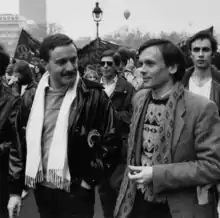Jean Le Bitoux
Jean Le Bitoux (16 August 1948 – 21 April 2010) was a French journalist and gay activist. He was the founder of Gai pied, the first mainstream gay magazine in France. He was a campaigner for Holocaust remembrance of homosexual victims. He was the author of several books about homosexuality.
Jean Le Bitoux | |
|---|---|
 Jean Le Bitoux (right) with Yves Navarre, 1981 | |
| Born | 16 August 1948 Bordeaux, France |
| Died | 21 April 2010 (age 61) Paris, France |
| Resting place | Père Lachaise Cemetery |
| Occupation | Journalist |
Early life
Jean Le Bitoux was born on 16 August 1948 in Bordeaux, France.[1][2] His father was an admiral.[3]
Career
Le Bitoux worked as a substitute music teacher.[3]
Le Bitoux founded the Front homosexuel d'action révolutionnaire (FHAR) in Nice in the 1970s.[1][2] By 1978, he ran for the National Assembly as a "homosexual candidate" alongside Guy Hocquenghem; they lost the election.[1][2]
In 1979, Le Bitoux founded Gai pied, the first long-running commercially published gay magazine in France.[1][2] Its name, coined by philosopher Michel Foucault, literally means "gay foot," but constitutes a multilayered pun in French: The two words pronounced together sound like "guêpier" (hornet's nest), while the word "foot" also evokes a "kick in the ass" ("un pied au cul") and sexual pleasure ("prendre son pied," equivalent to "to get off").[3] Le Bitoux resigned from the publication in 1983 due to the magazine's increasingly consumerist orientation.[4]
Le Bitoux joined AIDES, an HIV/AIDS awareness non-profit organization, in 1985.[4][5] He co-wrote many HIV prevention documents.[4] He was the editor-in-chief of the Journal du Sida, a publication about HIV/AIDS.[2]
In 1989, Le Bitoux founded the Mémorial de la Déportation Homosexuelle, a nonprofit organization for the remembrance of homosexual victims of Nazi Germany9.[1][2] Initially, the organization was met with homophobia from some Holocaust survivors, who wrongly feared they were being smeared.[6] In 1994, Le Bitoux co-authored the memoir of Pierre Seel, a French homosexual who was deported by the Nazis for being gay.[1][2]
By the 1990s, Le Bitoux argued that anti-homosexual legislation in France harked back to laws devised by François Darlan of the Vichy government to end same-sex prostitution in 1942, not Nazi Germany.[7] However, Marc Boninchi, a Law professor at the University of Lyon, has argued that the first instance of legal discrimination dates back to prosecutor Charles Dubost's 1941 recommendations.[7] Meanwhile, Le Bitoux's 2002 Les oubliés de la mémoire led President Jacques Chirac to acknowledge the homosexual victims of persecution under the Nazi Regime.[2]
Le Bitoux was a co-founder of the Centre LGBT Paris-Île-de-France in 1991.[8]
Personal life
Le Bitoux was openly gay, and was rejected by his family for being gay.[1] Drawn to Maoism in his early twenties, he also left due to homophobia.[1] He contracted HIV/AIDS in the early 1980s.[2][4]
Death
Le Bitoux died on 21 April 2010 in Paris, France.[1] A memorial service conducted by Patrick Bloche was held in his honor at the city hall of the 11th arrondissement of Paris, with a performance by the Sisters of Perpetual Indulgence.[2] He was buried at the Père Lachaise Cemetery.[4]
Works
- Le Bitoux, Jean; Seel, Pierre (1994). Moi, Pierre Seel, déporté homosexuel. Paris: Calmann-Lévy. ISBN 9782702122778. OCLC 30927212.
- Le Bitoux, Jean (2002). Les oubliés de la mémoire. Paris: Hachette littératures. ISBN 9782012356252. OCLC 50541993.
- Chevaux, Hervé; Le Bitoux, Jean; Proth, Bruno (2003). Citoyen de seconde zone : trente ans de lutte pour la reconnaissance de l'homosexualité en France (1971-2002). Paris: Hachette Littératures. ISBN 9782012355682. OCLC 402382714.
- Le Bitoux, Jean (2005). Entretiens sur la question gay. Béziers: H & O. ISBN 9782845470989. OCLC 60596632.
References
- Chemin, Anne (27 April 2010). "Jean Le Bitoux". Le Monde. Retrieved 11 August 2016.
- Halperin, David M. (Spring 2011). "Michel Foucault, Jean Le Bitoux, and the Gay Science Lost and Found: An Introduction". Critical Inquiry. 37 (3): 371–380. doi:10.1086/659349. JSTOR 10.1086/659349. S2CID 162264764.
- Martel, Frédéric (1999). The Pink and the Black: Homosexuals in France since 1968. Stanford, California: Stanford University Press. pp. 107–108. ISBN 9780804732734. OCLC 42643256.
- Favereau, Eric (30 April 2010). "Jean Le Bitoux, militant de la mémoire gay". Libération. Retrieved 11 August 2016.
- Broqua, Christophe (2005). Agir pour ne pas mourir ! Act up, les homosexuels et le sida. Paris: Les Presses de Sciences Po. pp. 115–161. ISBN 9782724609813. OCLC 469793514 – via Cairn.info.
- Celse, Michel (1997). "Il paraît que le mouvement gai a 100 ans..." Vacarme (in French). 3 (3): 44–46. doi:10.3917/vaca.003.0044.
Cette revendication se heurte régulièrement à des refus violemment homophobes de la part de différentes associations d'anciens déportés, qui y voient une entreprise visant à salir leur mémoire.
- Boninchi, Marc (2005). Vichy et l'ordre moral. Paris: PUF. pp. 143–193. ISBN 9782130553397. OCLC 420826274 – via Cairn.info.
- Aldrich, Robert; Wotherspoon, Garry (2001). Who's Who in Gay and Lesbian History. New York: Routledge. p. 241. ISBN 9780415159821. OCLC 46843939.
External links
 Media related to Jean Le Bitoux at Wikimedia Commons
Media related to Jean Le Bitoux at Wikimedia Commons